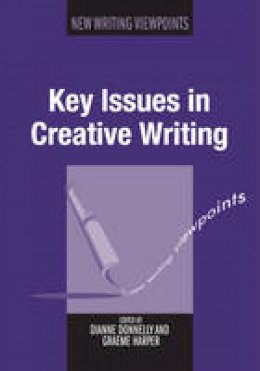
Stock image for illustration purposes only - book cover, edition or condition may vary.
Key Issues in Creative Writing
Dianne Donnelly
€ 44.05
FREE Delivery in Ireland
Description for Key Issues in Creative Writing
Paperback. This volume explores the teaching, learning and researching of creative writing. It outlines current issues, as defined by experts from the UK, USA and Australia. These expert contributors suggest solutions that will positively impact on the development of the discipline of creative writing in universities and colleges today and in the future. Editor(s): Donnelly, Dianne; Harper, Graeme. Series: New Writing Viewpoints. Num Pages: 208 pages. BIC Classification: CBV. Category: (P) Professional & Vocational; (UP) Postgraduate, Research & Scholarly; (UU) Undergraduate. Dimension: 153 x 213 x 10. Weight in Grams: 274.
Key Issues in Creative Writing explores a range of important issues that inform the practice and understanding of creative writing. The collection considers creative writing learning and teaching as well as creative writing research. Contributors target debates that arise because of the nature of creative writing. These experts - from the UK, USA and Australia - specifically examine creative writing as a subject in universities and colleges and discuss both the creative knowledge and the critical understanding informing the subject and its future. Finally, this volume suggests ways in which addressing current issues will produce significant disciplinary knowledge that will contribute to the success of creative writing in current and future academic environments.
Product Details
Publisher
Channel View Publications Ltd United Kingdom
Number of pages
208
Format
Paperback
Publication date
2012
Series
New Writing Viewpoints
Condition
New
Weight
274g
Number of Pages
208
Place of Publication
Bristol, United Kingdom
ISBN
9781847698469
SKU
V9781847698469
Shipping Time
Usually ships in 15 to 20 working days
Ref
99-15
About Dianne Donnelly
Dianne Donnelly, PhD, is the author of Establishing Creative Writing Studies as an Academic Discipline (2011) and the editor of Does the Writing Workshop Still Work? (2010). She is a regular contributor to the theory and pedagogy of creative writing and a frequent presenter at CCCC and AWP on creative writing pedagogy. She is on the editorial board for New Writing: The International Journal for the Practice and Theory of Creative Writing and Writing Commons, referees for the online peer-reviewed journal TEXT, and teaches writing at the University of South Florida. Graeme Harper, DCA PhD, is Professor and Director of The Honors College at Oakland University, Michigan. He has held professorships in the UK, USA and Australia, is an honorary professor in the UK and the Editor-in-Chief of New Writing: the International Journal for the Practice and Theory of Creative Writing. He recently also published On Creative Writing (2010), and is currently working on Creative Writing Challenges. A winner of the National Book Council Award for New Fiction (Aust.), and a Commonwealth Scholarship, he is Editor of the New Writing Viewpoints book series.
Reviews for Key Issues in Creative Writing
More than any other book currently available, Key Issues in Creative Writing maps out the possibilities and problems that confront creative writing in the academy in the early decades of the twenty-first century. Refusing to isolate creative writing from the complex and turbulent worlds it must inhabit, the contributors to this volume provide an absolutely indispensable overview of the issues facing the field. If you are interested in the future of creative writing as an academic enterprise, you simply must read this book.
Timothy Mayers, Millersville University of Pennsylvania, USA Creative writers studying, researching and teaching in universities are facing deep unsettling change, as are universities themselves and the economies in which they are embedded. Writers as individuals know about the creative value of uncertainty, experiment, bold thinking and embracing contradictions; this provocative collection points to ways of doing this for the discipline as a whole. With perspectives from the US, the UK and Australia, this is globalized thinking in the good sense - not homogenized but expanded by considering their deep differences as well as their shared interests. Here is an array of possibilities by which creative writing may not simply survive but positively evolve.
Philip Gross, Glamorgan University, UK
Timothy Mayers, Millersville University of Pennsylvania, USA Creative writers studying, researching and teaching in universities are facing deep unsettling change, as are universities themselves and the economies in which they are embedded. Writers as individuals know about the creative value of uncertainty, experiment, bold thinking and embracing contradictions; this provocative collection points to ways of doing this for the discipline as a whole. With perspectives from the US, the UK and Australia, this is globalized thinking in the good sense - not homogenized but expanded by considering their deep differences as well as their shared interests. Here is an array of possibilities by which creative writing may not simply survive but positively evolve.
Philip Gross, Glamorgan University, UK
